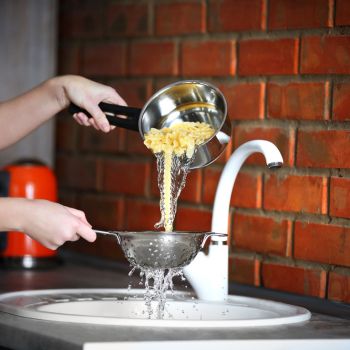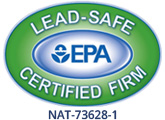Is It Safe to Pour Boiling Water Down the Drain?
 If water appears to flow sluggishly down the drain or pools in the sink basin, some people may attempt to fix the issue themselves. While plunging or snaking the drain often does the trick, pouring boiling water down the sink is a questionable DIY tactic.
If water appears to flow sluggishly down the drain or pools in the sink basin, some people may attempt to fix the issue themselves. While plunging or snaking the drain often does the trick, pouring boiling water down the sink is a questionable DIY tactic.
This action can actually cause more water to build up, won’t dislodge the clog and may damage your pipes or the rubber and seals holding them together. Beyond fixing a clog, pouring boiling water down the sink is a common habit when preparing dinner – for example, placing a pasta strainer in the sink.
Learn why you should avoid this practice and alternatives for breaking up a clogged drain.
Pipe Materials and Temperature
The argument against pouring boiling water down your drain comes down to science. Certain materials simply can’t handle high temperatures and will melt, distort or come apart in some fashion.
For plumbing materials, iron and copper provide the greatest heat resistance. Galvanized steel comes at a distant third, while plastic-based pipes like PEX and CPVC are more sensitive.
While this practice won’t ruin metal pipes, the temperature of boiling water (212°F) can:
- Gradually damage PVC and PEX pipes, resulting in leaks or other plumbing issues requiring whole segments to be replaced.
- Melt or detach the seals holding together copper or other metal pipes, also contributing to a leak around a joint.
What About for Clogs?
In the context of using boiling water to unclog a drain:
- The boiling water often sits in the pipe upon passing through a drain, heating up and softening the material in response.
- While hot water can help wash away grease and other buildup, it can also push a clog farther along the drain. As a result, the clog temporarily appears to get better before your sink is sluggish again in a month.
- Should you repeatedly engage in this habit, you risk melting the pipes and joints directly below your sink, requiring replacement.
- When you pour boiling water into the basin of your sink, the temperature may be high enough to crack the porcelain material.
- You risk the boiling water splashing back at you, potentially causing serious, painful burns that require medical attention.
Alternative Strategies for Unclogging a Drain
Rather than try boiling water or the vinegar and baking soda method:
- Plunge or snake your drain before calling a professional to look at the issue
- Never pour cooking oil or another greasy substance down the drain
- Limit what you put in the garbage disposal
- Run hot water from the faucet down the sink drain to wash away accumulated debris
Are you looking to address a clog or water that flows too slowly down the sink drain? Contact MJ Fahy & Sons to have our professionals unclog your plumbing today.




